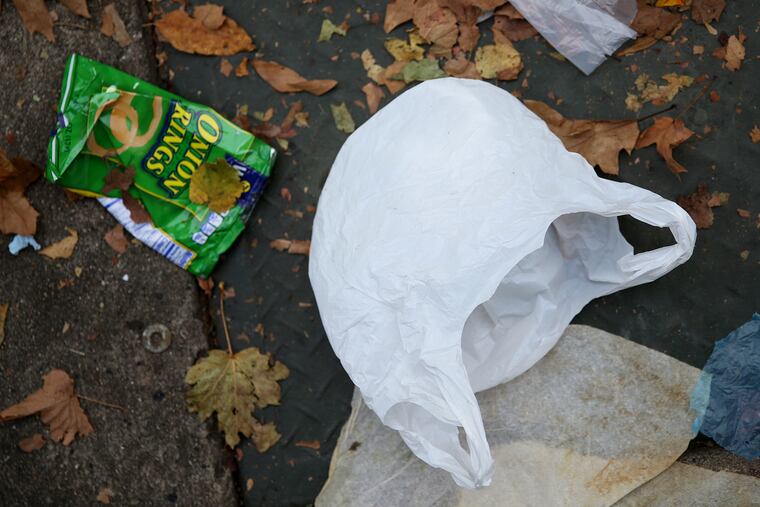Pennsylvania and New Jersey have new laws on the books in 2020
Many of the new laws will have an impact on daily life, from a hike in the minimum wage to changes in how people vote and a ban on plastic bags. Here's how the laws will affect you in 2020.

The new year brings new laws in Pennsylvania and New Jersey.
Many of them will have an impact on daily life, from a hike in the minimum wage to changes in how people vote and a ban on plastic bags.
Here’s a roundup of notable laws going into effect in the region:
Minimum-wage hike in N.J.
As of Jan. 1, New Jersey’s minimum wage is $11 an hour.
The hike is part of a five-year plan to ultimately raise the state’s minimum wage to $15 by 2024, which could raise pay for more than one million Garden State workers. New Jersey’s Democratic-led state Legislature passed the landmark wage bill and Gov. Phil Murphy signed it in 2019.
Twenty-four states and 48 cities and counties plan to raise their minimum wages in 2020, according to the National Employment Law Project.
Voting reforms in Pa.
Casting a ballot in 2020 will be a little different in Pennsylvania.
Voters will no longer need an excuse to vote by mail, which was previously required for Pennsylvania voters who wanted to vote absentee. Pennsylvania residents will also be able to cast a ballot by mail up to 50 days before an election. These provisions will be in effect for the state’s April 28 primary.
The changes are part of a voting reform bill signed by Gov. Tom Wolf in 2019. Other changes include a $90 million bond for counties to purchase voting systems that will keep a paper trail of ballots cast. Voters will also be able to request mail-in or absentee ballots for all primary, general, and special elections in a given year, and register to vote 15 days before an election.
Plastic bag ban in local N.J. towns
Ten New Jersey towns and one county have begun restricting single-use plastic bags as of Jan. 1, when local ordinances went into effect.
Rules vary in strictness based on the municipality. In Camden County, single-use plastic bags are banned in all county facilities and county-sponsored events, as are plastic straws, stirrers, Styrofoam containers, and single-serve bottled water. Places like Asbury Park and Ridgewood are banning businesses from handing out single-use plastic bags.
Garden State towns are increasingly restricting the use of plastic bags through local action while a measure to ban them statewide is being debated in the Legislature. The statewide bill under consideration would also ban Styrofoam containers — like those used for takeout food — and paper bags.
Across the Delaware River, Philadelphia also banned single-use plastic bags, but delayed implementation until July.
Criminal justice reform in Pa.
Two criminal justice bills in Pennsylvania go into effect in 2020.
The laws eliminate delays for prisoners on the path to consideration for parole and expand drug treatment programs in hopes of keeping more people out of prison. Lawmakers will use the savings from a smaller prison population to fund more programs that aim to reduce recidivism.
Pennsylvania is plagued by recidivism rates as high as 60%, which costs the state $224 million annually, according to the Commonwealth Foundation.
Renters’ right to counsel in Philadelphia
Philadelphia will provide free legal representation to low-income tenants at risk of being evicted, after a bill detailing the measure passed unanimously by City Council and was signed by Mayor Jim Kenney in December.
Implementation will ramp up in 2020, and take multiple years to fully phase in, as funding and staffing for the initiative become available.
Under the law, tenants whose annual gross income does not exceed $24,980 for a single person and $51,500 for a family of four will qualify for free legal representation provided by local nonprofits.
Renters who meet the income guidelines — including those who live in housing managed and owned by the city’s Housing Authority — are eligible.
Ban on asking salary history in N.J.
New Jersey employers can no longer ask for a job applicant’s salary history, due to a law that passed in 2019 to combat gender inequality and pay inequity in Garden State workplaces.
Under the law, any employer found asking for — or obtaining — a job candidate’s salary history will be fined $1,000 for a first offense, $5,000 for a second violation, and $10,000 subsequently.
In New Jersey, women who work full time and year-round earn 82 cents for every dollar paid to men, studies show.